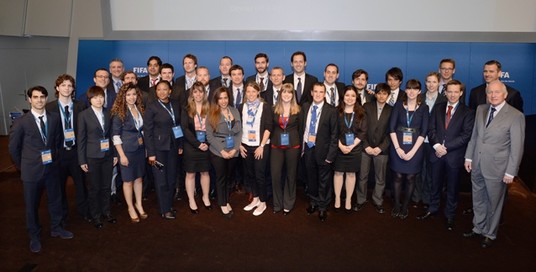
On Friday 19th April 2013, the CIES/FIFA Master 13th edition made a prestigious visit to the Fédération Internationale de Football (FIFA) headquarters in Zürich.
The CIES is proud of the increasing numbers of course graduates who are now working at FIFA and the visit to Zürich this year was made particularly special with so many of those alumni (working at FIFA) able to take part in the programme of lectures and presentations.
During this visit, Tsuneyasu Miyamoto, student of the 13th edition of this prestigious Master, took time out for an exclusive interview with FIFA.com. The former Gamba Osaka, Red Bull Salzburg and Vissel Kobe defender believes that “football in Japan has progressed incredibly. Currently there’s fantastic work being done at grassroots level and I think we’re reaping the rewards of the 2002 World Cup, which had a huge impact on my country. I wouldn’t be surprised to see a large number of Japanese players at big European clubs in the next ten years,” he said.
“The fact that a high number of matches from European leagues are currently widely available on television has contributed to football’s increasing popularity in Japan”, Miyamoto continued.
The former captain of the Japanese national team and current student of the FIFA Master ensures that the constant development of football in his country will allow the Blue Samurais “to win the World Cup in the upcoming 20 years”.
Asked about his experiences as a student of the FIFA Master, Miyamoto, who earned 71 caps for his country, revealed that he has “learned a great deal in the areas of humanities, management and law in sport. It’s something I’d definitely recommend to other footballers. As a player you learn a lot about being out on the pitch, but management and law are subjects that require a special kind of education.”
Miyamoto believes the FIFA Master has given him a more rounded view of the challenges football faces today. “In general I think our sport is going through a tough time financially, which is why I believe having a quality education in the areas of management and marketing is fundamental.”
The former Samurai Blue captain is one of a group of 30 students from 24 countries (Bosnia and Herzegovina, Brazil, China PR, Cyprus, France, Germany, India, Israel, Italy, Japan, Lesotho, Mexico, Morocco, Netherlands, New Zealand, Peru, Portugal, South Africa, Sweden, Switzerland, Ukraine, United Arab Emirates, United Kingdom and United States) aiming to graduate from the FIFA Master course in July.
Over the past 12 years, the FIFA Master has established itself as one of the world’s leading postgraduate programmes in the area of sport. A survey carried out in 2012 by the prestigious SportBusiness International magazine ranked the FIFA Master as Europe’s best postgraduate sports course provider.
Fully endorsed by FIFA and organised by the International Centre for Sports Studies (CIES), the FIFA Master was created in 2000 with the aim of providing qualified students from all over the world with a comprehensive understanding of the social, economic and legal dimensions of sport. About 90 per cent of the more than 300 FIFA Master graduates are in permanent employment within the sports industry.
Miyamoto is keeping his career options open and while he has not ruled out a coaching role, his long-term objective is to take on a position in sports management that would allow him to make “important decisions.”
“As a captain of Japan I saw and learned many things on the pitch”, Miyamoto said. "Now I would like to put them into practice off it.”
While Miyamoto’s own future may as yet be undecided, he is looking forward to the forthcoming tournaments to be hosted in Brazil. “If we manage to qualify, I think our team could reach the 2014 World Cup quarter-finals. It’s good that we’re playing in the Confederations Cup this year, as it’ll be an excellent yardstick to see where we’re at as a team, and in particular to assess the progress of our younger players."
This website uses cookies – limited to technical and analytical cookies – in order to allow your browsing and enhance your experience.
For more information, please see our cookie policy and our privacy notice.